Glam rock is a style of rock music that developed in the United Kingdom in the early 1970s and was performed by male musicians who wore flamboyant and feminine clothing, makeup, and hairstyles, particularly platform shoes and glitter, and female musicians who wore masculine clothing. Glam artists drew on diverse sources across music and throwaway pop culture, ranging from bubblegum pop and 1950s rock and roll to cabaret, science fiction, and complex art rock. The flamboyant clothing and visual styles of performers were often camp or androgynous, and have been described as playing with other gender roles. Glitter rock was a more extreme version of glam rock.

Let It Be is the twelfth and final studio album by the English rock band the Beatles. It was released on 8 May 1970, almost a month after the group's public break-up, in tandem with the documentary of the same name. Concerned about recent friction within the band, Paul McCartney had conceived the project as an attempt to reinvigorate the group by returning to simpler rock 'n' roll configurations. Its rehearsals started at Twickenham Film Studios on 2 January 1969 as part of a planned television documentary showing the Beatles' return to live performance.

Pet Sounds is the eleventh studio album by the American rock band the Beach Boys, released on May 16, 1966 by Capitol Records. It was initially met with a lukewarm critical and commercial response in the United States, peaking at number 10 on the Billboard Top LPs chart. In the United Kingdom, the album was lauded by critics and reached number 2 on the Record Retailer chart, remaining in the top ten for six months. Promoted there as "the most progressive pop album ever", Pet Sounds was recognized for its ambitious production, sophisticated music, and emotional lyrics. It is now considered to be among the greatest and most influential albums in music history.
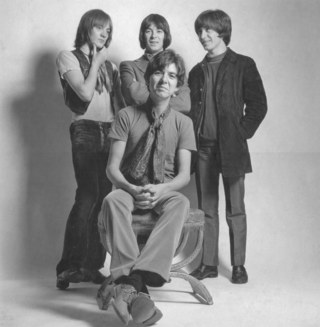
Small Faces were an English rock band from London, founded in 1965. The group originally consisted of Steve Marriott, Ronnie Lane, Kenney Jones and Jimmy Winston, with Ian McLagan replacing Winston as the band's keyboardist in 1966. The band was one of the most acclaimed and influential mod groups of the 1960s, recording hit songs such as "Itchycoo Park", "Lazy Sunday", "All or Nothing" and "Tin Soldier", as well as their concept album Ogdens' Nut Gone Flake. They evolved into one of the UK's most successful psychedelic bands until 1969.
Electric blues is blues music distinguished by the use of electric amplification for musical instruments. The guitar was the first instrument to be popularly amplified and used by early pioneers T-Bone Walker in the late 1930s and John Lee Hooker and Muddy Waters in the 1940s. Their styles developed into West Coast blues, Detroit blues, and post-World War II Chicago blues, which differed from earlier, predominantly acoustic-style blues. By the early 1950s, Little Walter was a featured soloist on blues harmonica using a small hand-held microphone fed into a guitar amplifier. Although it took a little longer, the electric bass guitar gradually replaced the stand-up bass by the early 1960s. Electric organs and especially keyboards later became widely used in electric blues.

Galaxie 500 was an American alternative rock band that formed in 1987 and split up in 1991 after releasing three albums: Today, On Fire and This Is Our Music. The band was made up of guitarist/vocalist Dean Wareham, drummer Damon Krukowski and bassist and vocalist Naomi Yang.

The Madcap Laughs is the debut solo album by the English singer-songwriter Syd Barrett. It was recorded after Barrett had left Pink Floyd in April 1968. The album had a lengthy recording history, with work beginning in May 1968, but the bulk of the sessions taking place between April and July 1969, for which five different producers were credited − including Barrett, Peter Jenner, Malcolm Jones, and fellow Pink Floyd members David Gilmour and Roger Waters. Among the guest musicians are Willie Wilson from Gilmour's old band Jokers Wild and several members of Soft Machine.

Ben-Hur is a 1959 American religious epic film directed by William Wyler, produced by Sam Zimbalist, and starring Charlton Heston as the title character. A remake of the 1925 silent film with a similar title, it was adapted from Lew Wallace's 1880 novel Ben-Hur: A Tale of the Christ. The screenplay is credited to Karl Tunberg, but includes contributions from Maxwell Anderson, S. N. Behrman, Gore Vidal, and Christopher Fry. The cast also features Stephen Boyd, Jack Hawkins, Haya Harareet, Hugh Griffith, Martha Scott, Cathy O'Donnell and Sam Jaffe.
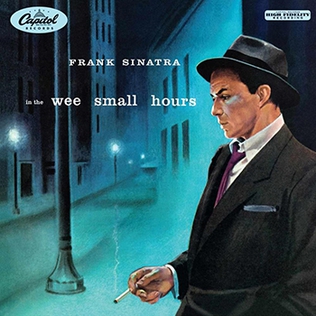
In the Wee Small Hours is the ninth studio album by American vocalist Frank Sinatra. It was released in April 1955 by Capitol and produced by Voyle Gilmore with arrangements by Nelson Riddle. The album's songs deal with themes such as introspection, melancholy, lost love, failed relationships, depression and night life. The cover artwork reflects these themes, portraying Sinatra alone at night on an eerie and deserted city street awash in blue-tinged street lights.

Easy Action is the second studio album by the American rock band Alice Cooper, released by Straight Records in March 1970. The title comes from a line from one of the band's favorite films, the musical West Side Story. As with Pretties for You, the band's debut from the previous year, Easy Action was neither a commercial nor critical success. Singles include "Shoe Salesman" and "Return of the Spiders".

Grotesque (After the Gramme) is the third studio album by English band the Fall. Released on 17 November 1980, it was the band's first studio album on Rough Trade.
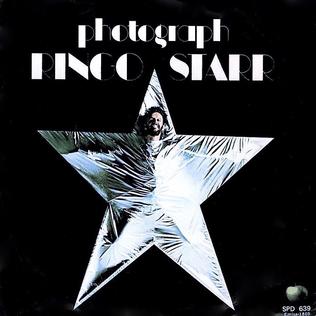
"Photograph" is a song by English rock musician Ringo Starr that was released as the lead single from his 1973 album Ringo. Starr co-wrote it with George Harrison, his former bandmate from the Beatles. Although they collaborated on other songs, it is the only one officially credited to the pair. A signature tune for Starr as a solo artist, "Photograph" was an international hit, topping singles charts in the United States, Canada and Australia, and receiving gold disc certification for US sales of 1 million. Music critics have similarly received the song favourably; Stephen Thomas Erlewine of AllMusic considers it to be "among the very best post-Beatles songs by any of the Fab Four".
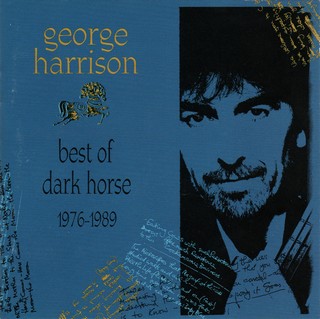
Best of Dark Horse 1976–1989 is a compilation album by British musician George Harrison, released in October 1989. His second compilation, after the Capitol/EMI collection The Best of George Harrison (1976), it contains songs from Harrison's releases on his Dark Horse record label between 1976 and 1987. The album also includes a 1989 single, "Cheer Down", which was Harrison's contribution to the soundtrack of the film Lethal Weapon 2, and two tracks recorded specifically for the collection: "Poor Little Girl" and "Cockamamie Business". Despite the popularity of Harrison's work over this period – both as a solo artist with his Cloud Nine album (1987), and as a member of the Traveling Wilburys – the compilation failed to achieve commercial success.

Rock Bottom is the second solo album by former Soft Machine drummer Robert Wyatt. It was released on 26 July 1974 by Virgin Records. The album was produced by Pink Floyd's drummer Nick Mason, and was recorded following a 1973 accident which left Wyatt a paraplegic. He enlisted musicians including Ivor Cutler, Hugh Hopper, Richard Sinclair, Laurie Allan, Mike Oldfield and Fred Frith in the recording.
Simon Rogers is an English musician, record producer and composer who has been a member of The Fall, and The Lightning Seeds.

"Letting Go" is a song credited to Paul and Linda McCartney and originally released by Wings on their 1975 album Venus and Mars. The song was remixed and released as a single on 4 October 1975 in the United States, and on 18 October 1975 in the United Kingdom. The song peaked at number 41 in the UK, 41 on the Cash Box Top 100 and number 39 on the Billboard Hot 100.

For the Love of Mike is a 1927 American silent romantic drama film. Directed by Frank Capra, it starred Claudette Colbert and Ben Lyon. It is now considered to be a lost film.
John Barham is an English classical pianist, composer, arranger, producer and educator. He is best known for his orchestration of George Harrison albums such as All Things Must Pass (1970) and for his association with Indian sitar maestro Ravi Shankar.

Live: Ravi Shankar at the Monterey International Pop Festival is a live album by Indian sitarist Ravi Shankar, released on the World Pacific record label in November 1967. It consists of part of Shankar's celebrated performance at the Monterey International Pop Festival in California on 18 June 1967. Shankar was accompanied throughout by his regular tabla player, Alla Rakha, who performs a frenetic five-minute solo on the recording.
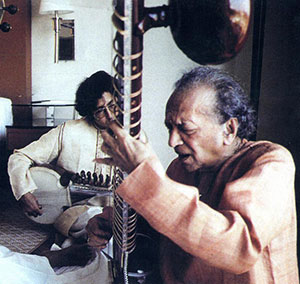
The Kinnara School of Music was a music school founded in Bombay, India, in 1962 by Indian classical musician Ravi Shankar. With his increased popularity and influence in the West, he opened a second branch of the school in Los Angeles in May 1967. Shankar's concept for Kinnara was to further the strict guru–shishya tradition of musical education that he had experienced under his teacher, Allauddin Khan, in the 1940s. The Bombay centre staged productions of orchestral works by Shankar, including Nava Rasa Ranga.















